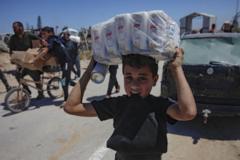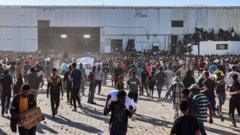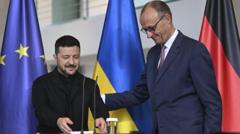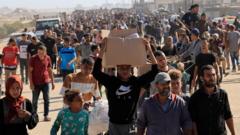The EU's top diplomat highlights the need for careful consideration of military actions in Gaza as the humanitarian crisis deepens with rising civilian casualties.
EU Raises Concerns Over Israeli Military Actions in Gaza

EU Raises Concerns Over Israeli Military Actions in Gaza
Kaja Kallas criticizes Israeli strikes as excessive and humanitarian aid distribution models drawing ire.
In the wake of escalating violence and a mounting death toll in Gaza, European Union's chief diplomat, Kaja Kallas, has expressed that Israeli military strikes "go beyond what is necessary" to combat Hamas. The comments emerged as the Hamas-run health ministry reported a staggering 3,924 fatalities due to the ongoing military actions initiated by Israel since the renewal of conflict in March after a brief ceasefire.
Kallas emphasized that the EU does not endorse a new humanitarian aid distribution model promoted by the US and Israel, which circumvents the United Nations and other established humanitarian organizations. "We don't support the privatisation of the distribution of humanitarian aid. Humanitarian aid cannot be weaponised," she stated, echoing concerns about the potential politicization of essential aid in conflicts.
Recent remarks from German Chancellor Friedrich Merz also joined the chorus of discontent regarding Israel's strategy, as he questioned the justification of harming civilians in the fight against Hamas terrorism. The EU, a significant humanitarian donor to the region, notes the majority of aid has been hampered due to Israel's blockade that has persisted since March, with Kallas revealing that the critical assistance meant for Gaza's residents remains largely blocked.
This chain of events includes harsh denunciations from EU Commission President Ursula von der Leyen, who labelled the latest strikes on civilian infrastructure as "abhorrent" and "disproportionate." Additionally, criticism from the UK, France, and Canada has intensified, with these countries calling for an end to the military offensive in Gaza, leading the UK to temporarily suspend trade discussions with Israel.
In light of the crisis, the EU has initiated a formal review of its trade agreement with Israel, with Kallas set to present potential options at the forthcoming EU foreign ministers' meeting. Current UN evaluations suggest that Gaza's 2.1 million residents are facing dire conditions exacerbated by a near three-month blockade that had only recently been somewhat relieved.
The Gaza Humanitarian Foundation (GHF), a controversial entity backed by Israel and the US, aims to manage aid distribution but has faced scepticism due to ethical concerns expressed by UN agencies. Israeli Prime Minister Benjamin Netanyahu has reiterated ambitions to resettle Gaza’s population, aiming to create what he describes as a "sterile zone," sparking fears of forced displacement among Gaza residents. The ongoing conflict traces back to Hamas' attack on October 7, 2023, which resulted in substantial casualties and heightened retaliatory actions from Israel, culminating in a staggering total of over 54,084 fatalities reported in the territory.
Kallas emphasized that the EU does not endorse a new humanitarian aid distribution model promoted by the US and Israel, which circumvents the United Nations and other established humanitarian organizations. "We don't support the privatisation of the distribution of humanitarian aid. Humanitarian aid cannot be weaponised," she stated, echoing concerns about the potential politicization of essential aid in conflicts.
Recent remarks from German Chancellor Friedrich Merz also joined the chorus of discontent regarding Israel's strategy, as he questioned the justification of harming civilians in the fight against Hamas terrorism. The EU, a significant humanitarian donor to the region, notes the majority of aid has been hampered due to Israel's blockade that has persisted since March, with Kallas revealing that the critical assistance meant for Gaza's residents remains largely blocked.
This chain of events includes harsh denunciations from EU Commission President Ursula von der Leyen, who labelled the latest strikes on civilian infrastructure as "abhorrent" and "disproportionate." Additionally, criticism from the UK, France, and Canada has intensified, with these countries calling for an end to the military offensive in Gaza, leading the UK to temporarily suspend trade discussions with Israel.
In light of the crisis, the EU has initiated a formal review of its trade agreement with Israel, with Kallas set to present potential options at the forthcoming EU foreign ministers' meeting. Current UN evaluations suggest that Gaza's 2.1 million residents are facing dire conditions exacerbated by a near three-month blockade that had only recently been somewhat relieved.
The Gaza Humanitarian Foundation (GHF), a controversial entity backed by Israel and the US, aims to manage aid distribution but has faced scepticism due to ethical concerns expressed by UN agencies. Israeli Prime Minister Benjamin Netanyahu has reiterated ambitions to resettle Gaza’s population, aiming to create what he describes as a "sterile zone," sparking fears of forced displacement among Gaza residents. The ongoing conflict traces back to Hamas' attack on October 7, 2023, which resulted in substantial casualties and heightened retaliatory actions from Israel, culminating in a staggering total of over 54,084 fatalities reported in the territory.





















